|
|
|
Sort Order |
|
|
|
Items / Page
|
|
|
|
|
|
|
| Srl | Item |
| 1 |
ID:
058818
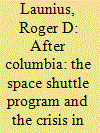

|
|
|
| 2 |
ID:
122526
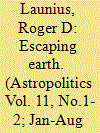

|
|
|
|
|
| Publication |
2013.
|
| Summary/Abstract |
What if we viewed the history of human spaceflight somewhat less through the lens of Cold War politics, which admittedly was central to the race to the Moon, but more as an expression of what might be called a religion of spaceflight? There seems to be a deeply religious quality to advocacy for the investment in and support for human space exploration, lending to the endeavor of a "higher purpose" that helps to explain both the generous nature of the actual investment and the ultimate unwillingness of Americans to eviscerate space budgets despite less than full support for space exploration. This article examines religious conceptions as a means of analyzing what might be termed a "space gospel." I lay out here the proposition that human spaceflight may be viewed as a religion with similar attributes to those present in mainstream religious denominations. This approach to exploring the history of human spaceflight offers a different and useful frame of understanding that broadens basic conceptions about this aspect of the human past.
|
|
|
|
|
|
|
|
|
|
|
|
|
|
|
|
| 3 |
ID:
000970
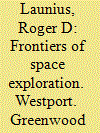

|
|
|
|
|
| Publication |
Westport, Greenwood Press, 1998.
|
| Description |
xx,204p.Hbk
|
| Standard Number |
0-313-29968-4
|
|
|
|
|
|
|
|
|
|
|
|
Copies: C:1/I:0,R:0,Q:0
Circulation
| Accession# | Call# | Current Location | Status | Policy | Location |
| 040421 | 629.45/LAU 040421 | Main | On Shelf | General | |
|
|
|
|
| 4 |
ID:
075910
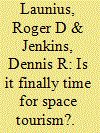

|
|
|
|
|
| Publication |
2006.
|
| Summary/Abstract |
To date, only four paying space tourists have flown, and the prospect for broad, sustainable space tourism remains a dream. This article notes that there are two types of tourists conflated by the advocates of space tourism. The first are a tiny group of adventurers with significant wealth and other resources who seek thrills and bragging rights. They have enjoyed success in using government-owned resources for their extreme tourism experience by flying on Soyuz capsules operated by Russia, and the International Space Station owned and operated by a consortium of nations as a major research station. The second group seeks more modest excursions with a minimum of risk and a smaller price tag. Only the first group has much prospect for tourism in space in the foreseeable future, but the second group is the more important, and expanding its space tourism opportunities represents the primary means of achieving the goal of opening space to the public. This article also differentiates between private sector suborbital space tourism, which may achieve reality within the next five to seven years, and the prospects for orbital space tourism, which are at least an order of magnitude more difficult and will probably require at least another generation of technological work to achieve.
|
|
|
|
|
|
|
|
|
|
|
|
|
|
|
|
| 5 |
ID:
111262
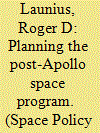

|
|
|
|
|
| Publication |
2012.
|
| Summary/Abstract |
The current debate over the future of human spaceflight in the USA has been a fascinating, and troubling, exercise in futility for those inextricably committed to an expansive vision of human exploration and development of space. The retirement of the Space Shuttle, originally set for the end of 2010 but later extended into 2011, the technical and funding problems of the Constellation follow-on program that led to its cancellation in 2009, and the emergence of commercial vendors who might be able to offer human access to Earth orbit have all complicated the current environment. In view of this situation, the question may be legitimately asked: what might we learn from earlier efforts to develop a human spaceflight capability the last time such a transition took place? Using the post-Apollo transition from the ballistic capsule to a winged, reusable vehicle as a case study, this article seeks to illuminate the planning, decision-making, economic, and political issues that have arisen in this policy debate. It suggests that a web of interlocking issues-only one of which was technical-affected the course taken. Instead, politics, economics, social and cultural priorities, values, and institutional considerations all helped to frame the debate and shape the decision.
|
|
|
|
|
|
|
|
|
|
|
|
|
|
|
|
| 6 |
ID:
135160
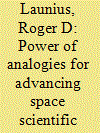

|
|
|
|
|
| Summary/Abstract |
It is a truism that every person in every organization ever created uses history to make decisions on a daily basis. This is essentially accomplished through the use of analogy, suggesting that some issue under current scrutiny is like, may be compared to, or otherwise is related to some historical example. Understanding what happened in those past, analogous instances therefore serves a valuable purpose in considering what to do in the present. The difficulties of analogs, however, are that they are routinely poorly applied to considerations of policies, priorities, and decision making which might effectively be informed by careful analog studies. Unfortunately, most uses of historical understanding are implicit, relying on personal anecdotes and employing faulty logic in the comparison. We have certainly seen this in the context of issues concerning the exploration of the space frontier since virtually the beginning of the space age. These range from analogs comparing modern cruise ship vacations and future space tourism to using the space race between the United States and the Soviet Union of the 1960s as an analog to predict a similar space race between the United States and China.
|
|
|
|
|
|
|
|
|
|
|
|
|
|
|
|
| 7 |
ID:
135163
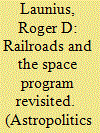

|
|
|
|
|
| Summary/Abstract |
While many are familiar with the enticing of American transcontinental railroad construction through land grants from national, state, and local governments, there was a range of other stimulative efforts to facilitate railroad development. These included tax breaks, investment credits, and otherwise favorable decisions supporting these business interests. They also involved, in some instances, direct subsidies; monopolies not only on railroad operations but also in ancillary and even tertiary industries; and changes to regulations to ease requirements for labor, safety, and other factors. This article examines the analogue between railroad development in the U.S. and that of space exploitation specific to access to space, involving space launch technology development, drawing several key findings from the railroad experience. It suggests that there is a broad range of options that have been pursued in the past to stimulate investment in infrastructure—in this case in railroads—that have application for future space access operations. Not all of these options were successful—some failed outright and others had detrimental unintended consequences—and that is discussed as well.
|
|
|
|
|
|
|
|
|
|
|
|
|
|
|
|
| 8 |
ID:
089996
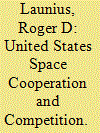

|
|
|
|
|
| Publication |
2009.
|
| Summary/Abstract |
From the very beginning of the space age, the ability to undertake non-military activities in this new regime has been an element of foreign policy. The mirror image twins international cooperation and competition between nation states has driven many of the key decisions in the major programs undertaken by the United States, especially in the evolution of its human spaceflight initiatives. For much of the Cold War era, head-to-head competition with the Soviet Union defined the human program, especially the Apollo program to land astronauts on the Moon. In the aftermath of the Cold War foreign policy objectives still inform the delineation of policy, especially the cooperative nature of large programs such as the International Space Station. This essay explores the evolution of the place assigned international space cooperation and competition in the United States.
|
|
|
|
|
|
|
|
|
|
|
|
|
|
|
|
|
|
|
|
|